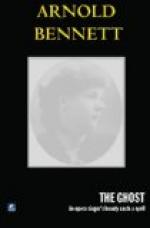“You mean,” she said, “that he is in love with me, and I chose just that night to—refuse him.”
I nodded.
“That is emotional cause enough, isn’t it, to account for any mysterious depression that any man is ever likely to have?”
“You are mistaken,” she said softly. “You don’t know Alresca. You don’t know his strength of mind. I can assure you that it is something more than unreturned love that is destroying him.”
“Destroying him?”
“Yes, destroying him. Alresca is capable of killing a futile passion. His soul is too far removed from his body, and even from his mind, to be seriously influenced by the mistakes and misfortunes of his mind and body. Do you understand me?”
“I think so.”
“What is the matter with Alresca is something in his most secret soul.”
“And you can form no idea of what it is?”
She made no reply.
“Doctors certainly can’t cure such diseases as that,” I said.
“They can try,” said Rosetta Rosa.
“You wish me to try?” I faced her.
She inclined her head.
“Then I will,” I said with sudden passionateness, forgetting even that I was not Alresca’s doctor.
The carriage stopped. In the space of less than a quarter of an hour, so it seemed to me, we had grown almost intimate—she and I.
Alresca’s man was awaiting us in the portico of the Devonshire, and without a word he led us to his master. Alresca lay on his back on a couch in a large and luxuriously littered drawing-room. The pallor of his face and the soft brilliance of his eyes were infinitely pathetic, and again he reminded me of the tragic and gloomy third act of “Tristan.” He greeted us kindly in his quiet voice.
“I have brought the young man,” said Rosa, “and now, after I have inquired about your health, I must go. It is late. Are you better, Alresca?”
“I am better now that you are here,” he smiled. “But you must not go yet. It is many days since I heard a note of music. Sing to me before you go.”
“To-night?”
“Yes, to-night.”
“What shall I sing?”
“Anything, so that I hear your voice.”
“I will sing ‘Elsa’s Dream.’ But who will accompany? You know I simply can’t play to my own singing.”
I gathered together all my courage.
“I’m an awful player,” I said, “but I know the whole score of ‘Lohengrin.’”
“How clever of you!” Rosa laughed. “I’m sure you play beautifully.”
Alresca rewarded me with a look, and, trembling, I sat down to the piano. I was despicably nervous. Before the song was finished I had lost everything but honor; but I played that accompaniment to the most marvellous soprano in the world.
And what singing! Rosa stood close beside me. I caught the golden voice at its birth. Every vibration, every shade of expression, every subtlety of feeling was mine; and the experience was unforgettable. Many times since then have I heard Rosa sing, many times in my hearing has she excited a vast audience to overwhelming enthusiasm; but never, to my mind, has she sung so finely as on that night. She was profoundly moved, she had in Alresca the ideal listener, and she sang with the magic power of a goddess. It was the summit of her career.




